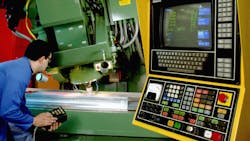These days, getting accepted into Harvard University is slightly easier than finding an industrial maintenance technologist to troubleshoot a complex machine communication problem.
In 2013, according to U.S. News and World Report, Harvard had an acceptance rate of 5.7 %. But if you put to work all recent industrial technology maintenance grads, you’d only fill 5.5 % of the available jobs in five of the leading manufacturing states, says James Wall, executive director of the National Institute for Metalworking Skills (NIMS).
Training programs for these technologists have been few and far between because they historically haven’t filled seats. “They tend to be under-enrolled compared to the job market that exists,” says Wall.
Wanting to raise the profile of the job and create a better training pipeline, NIMS today rolled out industry standards for training programs and credentials, in partnership with the Detroit-based national manufacturing institute Lightweight Innovations for Tomorrow (LIFT) and Indiana’s statewide Ivy Tech Community College.
“It really provides an industry validated framework for the schools and companies to build their curriculum around,” says Wall.
In precision machining, industry maintenance technologists make sure multi-act machines, robots and automated material handling systems are interconnected and talking with each other. In a large hospital system, they might handle communication between machines like specialized electrical and air handling units and medical devices used in surgical and X-ray suites. In food processing, they handle communications between the process, packing and distribution equipment.
Too often, when there’s a problem and no technician available, “the line shuts down and they’ve got to call in outside contractors,” says Wall. “In some cases, like with some of the machine tool manufacturers, they have to delay installing new machines for customers. It really limits companies’ expansion plans in many cases.”
The certification, initially intended for a five-state region along the I-75 corridor, will be available in the fall of 2016, after the first crop of students graduates. In addition, Ivy Tech will open a new instructor training facility to prepare 50 instructors at colleges from the five states—Ohio, Michigan, Indiana, Tennessee, and Kentucky--to teach the new coursework.
Job postings for highly skilled industrial maintenance workers have increased 60% in the five-state region. “We’re seeing people retiring at increasing rates,” says Wall.
Wall says that in Indiana, the shortage is so dire that “people in industry approached us. The manufacturing community was a catalyst to help this get off the ground.”
The technical workgroup developing the standards included representatives from the steel, aluminum, automotive, medical device, food processing and healthcare industries.
Entry-level workers in industrial maintenance technology typically make $18 or $19 an hour. The average median hourly rate is about $25 an hour, but “with additional skills, it’s not uncommon for them to be in the mid six-figure range,” says Wall.
The field is very specialized depending on the industry, so much of the training actually occurs after certification, on the shop floor. “That’s one of the things we also need to consider,” says Wall. “To really meet the industries’ needs, [workers] need to take an additional four or five or six years before they’re really competent at a high level. On the company side, we need to roll out apprenticeship models to get more talented people in the pipeline.”
About the Author

Laura Putre
Senior Editor, IndustryWeek
As senior editor, Laura Putre works with IndustryWeek's editorial contributors and reports on leadership and the automotive industry as they relate to manufacturing. She joined IndustryWeek in 2015 as a staff writer covering workforce issues.
Prior to IndustryWeek, Laura reported on the healthcare industry and covered local news. She was the editor of the Chicago Journal and a staff writer for Cleveland Scene. Her national bylines include The Guardian, Slate, Pacific-Standard and The Root.
Laura was a National Press Foundation fellow in 2022.
Got a story idea? Reach out to Laura at [email protected]
